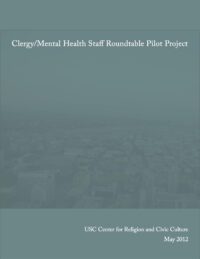Familiarity of MH staff with Religion
While mental health professionals tend to have lower levels of religiosity than the general population[1], the MH staff who participated in the Roundtables tended to be either currently or previously involved religiously. Some reported being highly involved in congregational life, even to the point of taking on leadership roles in their place of worship, and others had been raised in a religious tradition and now participated only occasionally, such as on holidays or special occasions. The religious traditions represented were Christian (including Catholic, Protestant, and Christian Science) and Jewish.
The Training of MH staff Regarding the Spiritual Realm
None of the MH staff had received formal training in their clinical degree programs regarding the role of religion and spirituality in the lives of consumers. Some MH staff reported that their training programs had taken a holistic approach to treatment—which meant not minimizing spirituality in the lives of clients—the programs did not include classes specifically geared towards learning how to address issues of religion or spirituality.
Despite their lack of formal training in religion and spirituality, the MH staff that we interviewed recognized the significance of religion in the lives of the consumers they serve. This was especially true for MH staff in SPA 6. Many found the Roundtable very helpful, and perhaps long overdue. One MH staff in SPA 6 said the following:
[F]rom my clinical experience, most conversations in therapy with clients of Latino or African American heritage will involve some sort of component of spirituality, nine times out of ten. And at the same time, they’re going to these clergy, the faith-based leaders in their community, telling them all of this same stuff, asking for assistance. Basically we’re both working with the same individuals, so it’s kind of like we’re collaborating to assist the same people. It was kind of about time that we started looking at these things and sharing resources and giving each other tips about how we deal with certain things.
Another SPA 6 MH staff said that the Roundtable had helped to fill the training gap regarding spiritual issues. “I work with older adults so spirituality is huge for them. Every time I have a question, anything I need to consult with them [clergy] on, I have done that,” he said.
One mental health program head reported that the first time she had consulted with a clergyperson regarding a case happened as a result of the Roundtable. She described a case involving a deeply religious child who felt his mental illness was a punishment from God. Unsure of how to proceed, she called a Catholic priest whom she had met through the Roundtable. As she relates her experience,
He gave me some Bible verses to give to the social worker to use with him and gave me some ideas of ways to present helpers to the child, things like, “God says many people can help us along the way, like a psychiatrist and the therapist”…I definitely would call up [clergy] again. Even personally, I was like, “I want to talk to you about the devil inside!”
The Training of Clergy Regarding the Psychological Realm
While the MH staff who participated in the Roundtable did not have formal training in the religious realm, clergy did have some formal training in psychology or in counseling. All of the clergy that were interviewed had either taken pastoral counseling classes as part of their seminary training or as a part of their continuing professional development. In fact, one clergyperson had extensive formal training and experience in the mental health field, having earned a master’s degree in psychology and worked as an MH staff before entering the ranks of the clergy. Other clergy also reported hands-on counseling experience. For example, one clergy member has done 40 hours of crisis counseling, and another had earned his certification as a chemical dependency counselor. A third clergy member completed a summer internship at an addiction recovery center for dual-diagnosed clients.
Because of the significant role that counseling plays in their work, our interviews identified a key finding: clergy would greatly benefit from additional training in understanding psychological processes. The clergy we interviewed reported spending anywhere from four to thirty hours per week counseling congregants, both formally and informally. The Roundtable has proven fruitful for them as they carry out this aspect of their ministry to individuals and families within their congregations. One pastor said that participating in the Roundtable has improved his ability to counsel congregants because it has “increased my arsenal of tools to work with.” Another clergy member said that participating in the Roundtable was helpful in allowing him to know when he was moving outside of his scope of practice:
One of the things we talked about was finding out whether or not something was beyond what you could do. That’s helped me a lot, to say, “OK, I see what’s going on, but this person needs something else.” That’s been the most direct outcome of this…I’ve been able to recognize this and perhaps point them in a direction where someone could give them help…
[1] See Koenig, H., “Religion and Mental Health: What Should Psychiatrists do?” The Psychiatrist, 32, 201–203 (2008), and Bergin, A. and Jensen, J., “Religiosity of Psychotherapists: A National Nurvey.” Psychotherapy, 27, 3–7, (1990).
